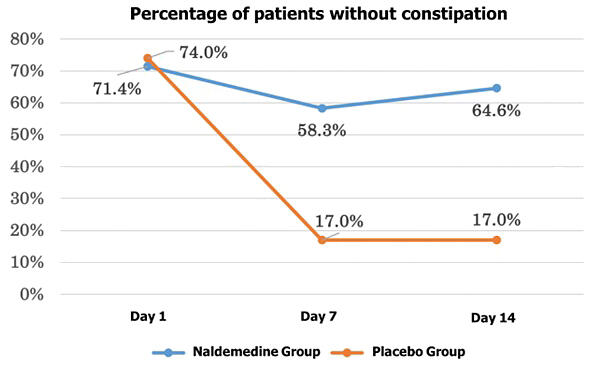A research group led by Assistant Professor Jun Hamano of the Institute of Medicine at the University of Tsukuba, and Clinical Associate Professor Shinya Kajiura of the Faculty of Medicine at the University of Toyama, has announced their research findings showing that the use of naldemedine, a laxative, can prevent constipation induced by strong opioid analgesics, such as morphine, in patients with cancer. The findings are expected to contribute to improvement in patients' quality of life (QOL). The study was published in the September 10 issue of the Journal of Clinical Oncology.

Provided by Jun Hamano, the University of Tsukuba
Opioids, which are used to control pain in cancer, often result in constipation as a side effect. This constipation (opioid-induced constipation: OIC) rarely resolves spontaneously and can significantly reduce the patient's QOL, making it difficult to continue treatment. There were no established methods to effectively prevent OIC.
Recent studies have shown that naldemedine (a peripherally acting µ-opioid receptor antagonist) is effective in treating OIC; however, it was unclear whether it can be used to prevent the issue. In response, the research group administered the drug (Symproic 0.2 milligrams) or a placebo (counterfeit drug) for 14 weeks to 99 patients with cancer starting the regular opioid use for the first time at four university hospitals in Japan. The mean age was 67.8 years in the naldemedine group and 66.4 years in the placebo group, and the female-to-male ratios were 51% and 68%, respectively.
In both groups, the most common cancer types were liver cancer, bile duct cancer, and pancreatic cancer. The primary endpoint was the percentage of patients without constipation (a Bowel Function Index score of less than 28.8) on day 14 of treatment. Secondary endpoints included the frequency of spontaneous bowel movements, QOL, and frequencies of nausea and vomiting.
The results showed that the percentage of patients without constipation on day 14 was 64.6% in the naldemedine group, significantly higher than 17% in the placebo group. They also showed a higher frequency of spontaneous bowel movements, improved QOL, and lower frequencies of nausea and vomiting in the naldemedine group. Moving forward, the group aims to verify the effectiveness of naldemedine in more detail by comparing its preventive effect with that of other laxatives.
Hamano commented, "Opioids are essential to relieve pain in patients with cancer, but their continuous use is difficult in some cases because they often cause constipation. As naldemedine was shown to prevent opioid-induced constipation in this study, its use is expected to ensure that patients with cancer who need opioids can have pain relief without having to worry about constipation."
University of Tsukuba English press release:
https://www.tsukuba.ac.jp/en/research-news/20240911140000.html
Journal Information
Publication: Journal of Clinical Oncology
Title: Naldemedine for Opioid-Induced Constipation in Patients With Cancer: A Multicenter, Double-Blind, Randomized, Placebo-Controlled Trial
Authors: J. Hamano, T. Higashibata, T. Kessoku, S. Kajiura, M. Hirakawa, S. Oyamada, K. Ariyoshi, T. Yamada, T. Morita et al.
Publication Date: 9.10.2024
DOI: 10.1200/JCO.24.00381
This article has been translated by JST with permission from The Science News Ltd. (https://sci-news.co.jp/). Unauthorized reproduction of the article and photographs is prohibited.




